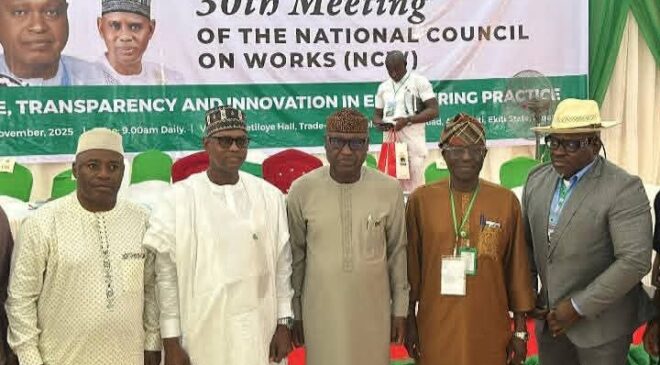
ADO-EKITI/Nigeria: Delta State Governor, Rt. Hon. Sheriff Oborevwori, has urged Nigerian leaders and stakeholders to embrace innovation, sustainability, and equity in the planning, financing, and execution of infrastructure projects across the country. He said that achieving meaningful national development requires strong intergovernmental collaboration and robust private sector participation.
Governor Oborevwori made the call on Thursday during the 30th Meeting of the National Council on Works held in Ado-Ekiti, Ekiti State. He was represented at the event by the State Commissioner for Works (Highways and Urban Roads), Comrade Reuben Izeze.
Describing the annual gathering as more than a policy forum, Oborevwori said it symbolizes a collective national commitment to building a resilient, inclusive, and sustainable infrastructure landscape that supports growth and unity.
He reaffirmed Delta State’s unwavering focus on infrastructure as a key driver of socioeconomic transformation, explaining that his administration’s MORE Agenda continues to prioritize the expansion of rural road networks, modernization of urban infrastructure, and improved connectivity across the state.
“From the creeks and coastal communities of the Niger Delta to the vibrant urban centres of Asaba, Warri, and Ughelli, our people understand that roads, bridges, and public works are not merely physical structures; they are lifelines of opportunity, access, and unity,” Oborevwori said.
The Governor emphasized that his administration has maintained policy continuity by completing inherited projects while also initiating new ones that align with the evolving needs and aspirations of Deltans.
He commended the Federal Ministry of Works for its proactive funding approach, especially through the continuation of NNPCL-funded projects under the Road Infrastructure Development and Refurbishment Investment Tax Credit Scheme, describing it as “a pragmatic and forward-looking intervention essential to unlocking the full potential of Nigeria’s road network.”
Oborevwori urged the Council to explore innovative financing models that blend public investment with private capital to ensure efficiency, accountability, and value for money in project delivery.
He also underscored the importance of sustainability in project design and execution, calling for the adoption of climate-resilient and environmentally friendly engineering solutions that can withstand emerging global challenges.
The Governor further emphasized equity in infrastructure distribution, noting that all regions of Nigeria—regardless of size or population—deserve fair and inclusive access to development projects that promote growth, cohesion, and opportunity.
Reiterating Delta State’s readiness to partner with the Federal Government and other states, Oborevwori assured that Delta would continue to bring its wealth of experience and commitment to national efforts aimed at transforming lives through infrastructure renewal.
He expressed optimism that the 30th Council Meeting, themed “Discipline, Transparency and Innovation in Engineering Practice,” would serve as a milestone in reshaping Nigeria’s infrastructure journey.
Welcoming delegates, Ekiti State Governor, Mr. Biodun Oyebanji, expressed delight at hosting professionals and policymakers whose expertise, he said, would help define the future of Nigeria’s infrastructure.
“Engineers are the backbone of progress. Their creativity and expertise will help us build a brighter, more prosperous Nigeria,” Oyebanji said. He also commended President Bola Tinubu for his ongoing support toward state and federal road rehabilitation projects, assuring that Ekiti would continue to work with the federal government to restore other critical transport assets across the state.
In his remarks, Minister of Works, Engr. David Umahi, represented by the Minister of State for Works, Bello Muhammad Goroyon, Esq., praised President Tinubu’s steadfast commitment to infrastructure renewal under the Renewed Hope Agenda. He described the council as a vital platform for shaping policy direction and improving engineering standards nationwide.
“Discipline ensures professionalism and ethical conduct. Transparency builds trust and public confidence. Innovation enables us to meet the evolving demands of modern infrastructure using tools such as drone mapping, geotechnical surveys, and climate-resilient materials,” Umahi stated.
Delegates at the meeting included federal and state government officials, engineers, policymakers, and representatives of professional bodies such as the Council for the Regulation of Engineering in Nigeria (COREN) and the Nigerian Society of Engineers (NSE).
The session ended with a collective commitment to deepen collaboration, strengthen engineering practices, and accelerate Nigeria’s journey toward sustainable, inclusive infrastructure growth.
